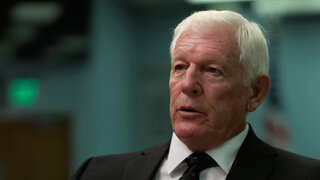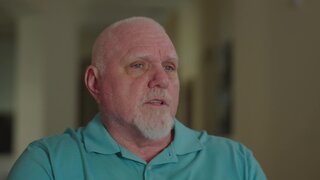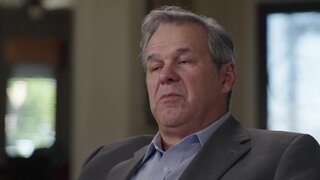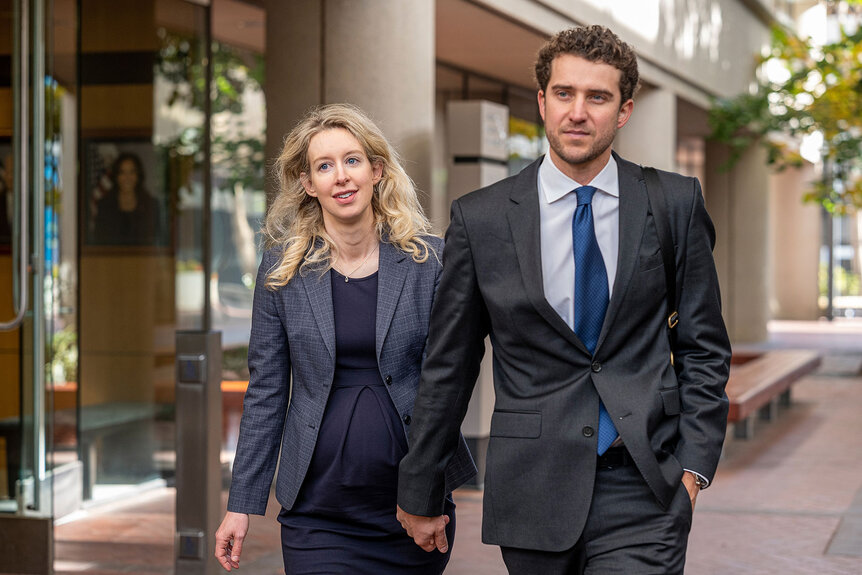From Enron To Madoff, Learn About The Most High-Profile White Collar Cases In US History
Learn more about some of the biggest white collar cases in the U.S., including the allegations against the so-called "Crypto King" Sam Bankman-Fried.
From Sam Bankman-Fried and FTX, to Elizabeth Holmes and Theranos, it seems like individuals accused of white-collar crimes are always in our social media and news feeds lately. The definition of white-collar crime includes crimes that are not violent, like some included in Oxygen's new series "Blood & Money," premiering March 11 at 9/8c — but they are not victimless, according to the FBI. White-collar crime can affect everyone, with examples ranging from health care fraud to corporate fraud to romance scams. Prosecutions of corporate and white-collar crimes hit an all-time low in 2022 — following a pattern of decline for more than a decade. Sixty-two percent of criminal referrals for white-collar offenses that federal prosecutors received were closed without any action last year.
These statistics are all according to the latest available case by case records from the U.S. Dept. of Justice as of Jan. 2023, compiled into a report by TRAC, a nonpartisan, nonprofit data research center that’s part of the Newhouse School of Public Communications at Syracuse University.
RELATED: How Cold Cases Get Solved: Experts On Thinking ‘Out Of The Box’ With New Techniques
Charges for white-collar criminal activity in 2022 were extraordinarily rare — just one percent.
During the fiscal year 2022, only 4,180 white-collar defendants were prosecuted. The number of prosecutions peaked in 2011, when prosecutions hit 10,162 — nearly two and a half times the current levels, according to the TRAC report.
Here’s a look at the most high-profile white-collar cases in U.S. history, brought to life in documentaries, TV shows, books, podcasts and movies.
1. Enron
The collapse of Enron in Dec. 2001 is still considered by the FBI to be its most complex and biggest white-collar crime investigation in its history.
The top executives at the Houston-based energy company cheated investors and filled their own pockets using complex accounting gimmicks like overvaluing assets to boost cash flow and earnings statements, according to the FBI. The idea was to deceive the public and the U.S. Securities and Exchange Commission about the true performance of Enron’s businesses. Enron declared bankruptcy in Dec. 2001, causing investors to lose millions.
In a five year-long investigation, FBI agents conducted more than 1,800 interviews and collected more than 3,000 boxes of evidence and more than four terabytes of digitized data. More than $164 million was seized—to date about $90 million has been forfeited to help compensate victims, according to the FBI.
Twenty-two people were convicted for their actions related to the fraud, including Chief Executive Officers Kenneth Lay and Jeffrey Skilling in May 2006 on charges including conspiracy, securities fraud, wire fraud and making false statements, according to the Department of Justice.
“With their convictions, we’ve convicted nearly the entire senior executive management team at Enron,” said Michael Anderson, supervisory special agent of the FBI Houston Enron Task Force, in a video marking 10 years since the convictions. “I think we sent a strong message to business executives around the country that the FBI and Department of Justice will hold executives accountable for their actions, regardless of their position in a company or any political affiliations.”
Less than six weeks after his conviction, and before he could be sentenced, Lay died at the age of 64 at his vacation home in Aspen, Colorado in July 2006, after suffering from a heart attack, according to NPR. The government had been seeking more than $40 million in restitution from him, but he claimed during the trial he was broke.
Skilling was sentenced to 24 years in prison, but in 2013, a federal judge reduced that sentence to 14 years, and he was released from federal custody in Feb. 2019, according to NBC News. Under the agreement, more than $40 million of Skilling’s fortune was distributed to victims of the scheme.
2. Bernie Madoff
The mastermind behind the largest Ponzi scheme ever in the United States, Bernie Madoff ruined the financial fortunes of thousands of people. He was first charged with securities fraud in Dec. 2008, after he told his employees that his advisory business was a fraud, and “all just one big lie.”
Madoff admitted that for years he’d been paying returns to certain investors out of the principal received from other, different investors — estimating the losses from this fraud were at least $50 billion, the SEC said.
The SEC made rule changes starting in 2009 to try and prevent this level of fraud from ever happening again. This included changes to how the agency carries out inspections of investment advisers and brokerage firms, as well as steps to provide better protection of customers’ assets against theft and abuse, Fortune reported. The agency also started a new electronic system for taking tips and complaints to better help detect fraud.
Madoff was sentenced to 150 years in prison for his massive fraud scheme and ended up dying at the age of 82 at the Federal Medical Center in Butner, N.C. in April 2021.
3. "Crypto King" Sam Bankman-Fried
Sam Bankman-Fried, the founder of the crypto exchange FTX, is expected to go on trial in October for an allegedly fraudulent scheme affecting thousands of victims. His case has drawn comparisons to the crimes of Bernie Madoff. He’s charged with two counts of wire fraud, and six counts of conspiracy-related charges, according to CNN.
He’s accused of “one of the biggest financial frauds in American history” for stealing billions of dollars in customer funds from FTX to cover losses at FTX’s sister hedge fund, Alameda Research, CNN reported. After FTX filed bankruptcy in November, Bankman-Fried said he didn’t commit fraud, and didn’t know customer funds were being used improperly.
FTX’s new CEO, John Ray III, made his name overseeing the liquidation of Enron in the early 2000s. He said in a congressional hearing that customer funds deposited on the FTX site were commingled with funds at Alameda, which made a number of speculative, high-risk bets, according to CNN.
Two senior executives, Gary Wang, the co-founder of FTX, and Caroline Ellison, Alameda’s CEO, pleaded guilty to multiple criminal charges, according to CNN. As he awaits trial, Bankman-Fried is on house arrest at his parents California home, on a $250 million bond. He could face up to 115 years in prison if convicted on all charges.
4. Jordan Belfort the "Wolf of Wall Street"
“Money is the oxygen of capitalism and I wanna breathe more than any man alive!” Jordan Belfort tweeted on Aug. 30, 2021.
It’s a mantra the man known as the “Wolf Of Wall Street” has keep for decades, as he is now a motivational speaker and author 24 years after he was convicted of money laundering and securities fraud in 1999. After prison, Belfort landed a book and film deal.
Leonardo DiCaprio played Belfort in the 2013 Martin Scorsese film “The Wolf Of Wall Street”—based on Belfort’s life as a wealthy stockbroker who was later accused of crime and corruption. Belfort even helped DiCaprio do research on how to play himself.
“I spent hundreds of hours with Leo doing everything you could imagine, from hanging out socially to showing him what it’s like to be on drugs,” Belfort told Vanity Fair. “I took him through the stages [of taking Quaaludes] and I was rolling on the floor in his house as he was filming me.”
The real-life Belfort used his stock firm Stratton Oakmont and deceptive tactics to inflate the prices of penny stocks before the company dumped their own shares and watched prices crash, according to Fox News. A judge ordered him to pay $110 million in restitution, in addition to prison time.
Just as in the movie, Belfort described his 22 months in a California prison as a “boys’ club,” according to Vanity Fair, calling his experience “completely mellow.”
“I played tennis three hours a day, and I’d write for maybe 12,” Belfort told Vanity Fair.
In 2020, Belfort sued Red Granite Pictures, the production company behind “The Wolf Of Wall Street” for $300 million dollars — part of an episode of CNBC’s “American Greed: Biggest Cons.”
Belfort signed over the rights to his two autobiographies, “The Wolf Of Wall Street” and “Catching the Wolf Of Wall Street” to the company in 2011.
Belfort ultimately dropped his lawsuit against Red Granite and agreed to take his claims to arbitration, according to the Hollywood Reporter.
5. Martha Stewart
The queen of recipes, gardening, home décor and crafts found herself behind bars in a prison jumpsuit after she was convicted of several felonies, including making false statements to investigators looking into the sale of a stock.
Martha Stewart spent five months in 2004 at a minimum-security federal prison in West Virginia. In June 2003, the SEC filed securities fraud charges against Stewart and her former stockbroker, Peter Bacanovic. The SEC alleged she committed illegal insider trading when she sold stock in a biopharmaceutical company, ImClone Systems, Inc., after getting an unlawful tip from Bacanovic.
The SEC said In Dec. 2001, Bacanovic tipped off Stewart that his other company clients, ImClone CEO Samuel Waksal and his daughter, had placed orders to sell ImClone stock they had at Merrill Lynch. That client secretly knew the FDA was about to reject ImClone’s cancer treatment called “Erbitux” and send stock prices plunging. The information about Waksal’s effort to sell was confidential under Merrill Lynch policy.
After getting the tip, the SEC alleged Stewart sold all 3,928 shares of her ImClone stock, and when the price of stock dropped, Stewart avoided losses of $45,673. The SEC also accused Stewart and Bacanovic of making up an alibi for Stewart’s trades and lying about what happened.
Forbes magazine estimated Stewart was worth $1 billion in 2000, but Stewart’s company worth dropped more than 50 percent after the insider trading scandal broke, and Stewart’s personal losses totaled more than $325 million in company holdings, according to ABC.
Since her time in prison, Stewart’s made a comeback—publishing more cookbooks and creating a cooking show with rapper Snoop Dogg.
6. Elizabeth Holmes
A little over a year ago, Theranos CEO Elizabeth Holmes was found guilty of fraud related to her startup business that promised to revolutionize blood testing and healthcare.
Holmes claimed Theranos created a new medical device that could replace phlebotomy and provide scores of blood screening results from samples as small as a blood droplet from a finger prick, according to Oxygen.com. The device, called the “Edison,” was pitched as an efficient and cheaper alternative to traditional blood-screening methods.
But Holmes was convicted of duping investors and patients about the flawed testing.
Theranos raised nearly a billion dollars from a long list of high-profile investors, including billionaires such as media mogul Rupert Murdoch and software magnate Larry Ellison, according to Oxygen.com.
During the trial, prosecutors alleged Theranos’ blood-testing technology kept producing misleading results that led the company to secretly rely on conventional blood testing. Evidence presented at the trial also showed Holmes lied about purported deals that Theranos had reached with big drug companies such as Pfizer and the U.S. military, according to Oxygen.com.
In November, Holmes was sentenced to more than 11 years in prison, and she’s scheduled to report to prison on April 27, according to Oxygen.com. She was given six months before the sentence began after it was revealed that she had gotten pregnant with her second child between her conviction and sentencing date.
7. McDonald's Monopoly Scandal
McDonald’s Monopoly game seems innocent enough to play as you down your Big Mac and McFlurry. But an ex-cop managed to not just cheat at the board game, but also rig the real-life game and steal $24 million. How did he pull it off?
Jerome Jacobson worked in security for Simon Marketing, which in the 90s, made the game pieces for McDonald’s Monopoly, as well as the McDonalds game Who Wants To Be A Millionaire, according to CNBC. The idea was for customers to win up to a million bucks in prizes by buying fries, burgers, nuggets and drinks from McDonalds. Jacobson’s job was to guard those pieces. But he figured out a way to rig it so the winning pieces ended up with people he knew—who would then share their money and prizes with him.
Jacobson and seven others were arrested by the FBI and the U.S. Department of Justice in August 2001 in what was called Operation “Final Answer.”
Jacobson’s job was to carry the pieces in a case shut with a tamper-proof seal—taking them to packaging centers around the county where he would apply them to things like French fry cartons that were randomly selected in a drawing. An independent auditor followed him to make sure the pieces were secure in the tamper proof case.
So how did he rig the game pieces while he was being watched?
A foreign supplier mistakenly sent a package of tamper-proof seals to Jacobson directly, instead of Simon Marketing, according to CNBC. It gave Jacobson a way of opening and re-sealing the packages of winning pieces. He snuck off to the men’s bathroom in airports on his way to McDonald’s packaging centers—where the female auditor couldn’t follow him—and made the switches before re-sealing the supply.
Jaconbson then used friends and family to recruit people who would pay tens of thousands of dollars upfront to Jacobson to secure winning game pieces worth hundreds of thousands of dollars, all the way up to the $1 million grand prize, CNBC reported.
Despite his attempts to hide his fraud, federal authorities caught on when they got an anonymous tip and realized the many McDonald’s winners clustered in Georgia and Florida.
When McDonald’s launched the game in 2001, the FBI was ready with wiretaps on recent suspicious winners as well as on Jacobson, who was a natural suspect as the head of security living near one of the clusters of winners.
Jacobson was sentenced to 37 months in prison, according to Oxygen.com reporting, and ordered to repay $12.5 million.
Others convicted in the scheme are also still paying back restitution, including ex-con and drug dealer Andrew Glomb, according to Oxygen.com.
For more true-crime content, tune in to Oxygen's new series "Blood & Money," premiering March 11 at 9/8c.





























